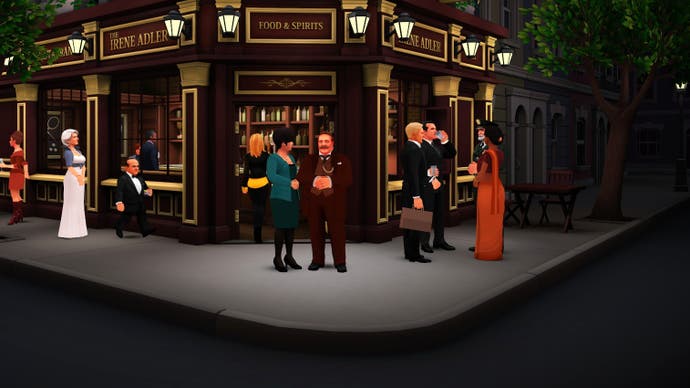SpyParty is gloriously tense to play - and a pure delight to watch
Banana bread.
To say I bounced off SpyParty after a morning might make it sound like I did not enjoy myself, or that the game's many pleasures failed to have much effect on me. In truth, I found those pleasures astonishingly effective. SpyParty, for me, is the sweetest torture imaginable. I played a morning's worth of matches if that, even so, I felt myself teetering on the very edge of terrifying depths, and so I fled.
I have never played a game quite like this, and yet it is so simple. SpyParty requires just two players, one of whom plays the spy while the other plays a distant sniper trying to kill the spy. The spy must mingle with a crowd of AI characters and pull off a series of simple missions within a set amount of time. The sniper must scan the faces, the wash of moving bodies and fluttering hands, and work out which of the people they can see is controlled by the first human player and must therefore be killed.
Each role offers a handful of complications. There are the missions that the spy must carry out, for example, each of which affords them ample opportunity to betray themselves. They might be spotted switching over a statue, for example, or bugging the ambassador, which involves getting close to the clearly signposted character in question and doing a certain hand gesture. But beyond those tasks and others, they might just give themselves away by not behaving like an AI character. They might stop in the wrong place. They might walk without the right kind of purpose. Or they might find themselves low on time and check their watch to add a few seconds to the clock - and get plugged while they're at it.
The sniper, meanwhile, has other problems. They have the crowd, for starters, and while you might feel like you are not blending in very well at all when you first play the spy, your first turn at the sniper can be just as panic-inducing as the screen seems filled with attention-grabbing people none of whom seem to move the way you expect AI-controlled characters to move. You can dilly-dally too long and run out of time. Or, you can lose yourself in the business of highlighting likely targets and lowlighting unlikely targets - one of the spy's missions in particular is very good for allowing you to rule out potential snipees - and then, in a panic, splatter the wrong person and discover you've just killed a civilian.
Man, it's good, but man it's also tense! And there is just enough to be getting on with - and within the tight confines of each map - to make me feel that I am all elbows. SpyParty is currently in early access, but while the lobby can be a bit disconcerting the first time you load in, the community is knowledgeable and extremely friendly - but oh boy, is that community spectating and rolling their eyes when you fumble through your first few catastrophic games? It is too much to think about.
I have not played enough of SpyParty to say much more - I gave it a tentative morning - but I had to write about it because it has stayed with past the point where I realised I could not stand the pressure, frankly, and I bolted, having won, according to my stats, precisely no games as spy or sniper. I suspect I will return to it as soon as I can, though, because I think I love SpyParty very dearly - I just love it as a spectator.
And it feels like a role I am playing more often of late. Even outside of the truly huge names of eSports, these are great days for spectating in games - in Fortnite, PUBG, in clan replays on Clash Royale - and SpyParty is right up there. The pubs and courtyards and office suites that the game plays out in are atmospheric and riddled with neat little references and hint at a certain kind of wealthy sumptuousness, the characters are a delight to watch going about their motions, and the tension that clouds the game when I am actually trying to play it all but disappears when I am sat in the game just watching others play, noting the ease with which a spy hides their actions or the decisiveness with which a sniper narrows in on a target.
It all reminds me a little bit of the early days of learning how to do cryptics - another simple game that cuts an intimidating figure all the same. In my first days battling Rufus over on the Guardian - except it never feels like battling when it's Rufus - I would spend hours turning the clues over in my head and then click to reveal the solutions. This is spectating, in a way, and it doesn't feel like giving in. It feels like basking in the reflected glow of someone else's generous brilliance.




